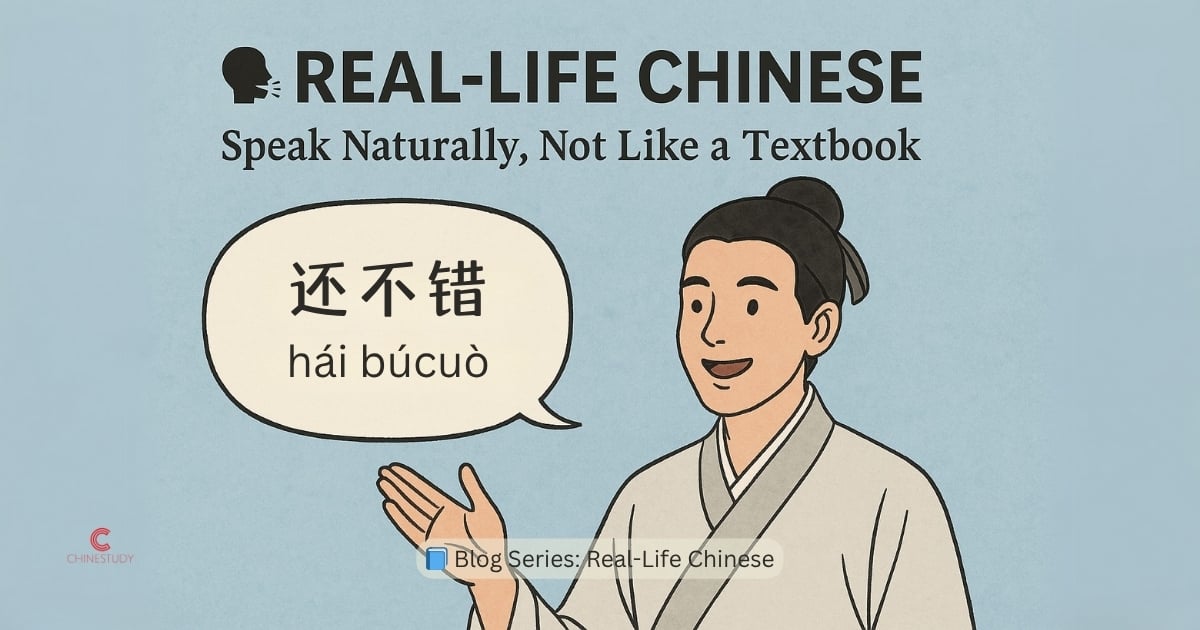How to Say “I’m Fine” the Way Locals Do — Not Just “我很好”

Want to answer “How are you?” like a real local? Start here.
📕 Textbook Chinese
我很好。 (Wǒ hěn hǎo.)
“I’m (very) good.”
This is often the first phrase learners are taught. But in real life, Chinese speakers rarely answer this way — it feels overly formal and a bit distant.
✅ Real Chinese
Try these more natural replies:
- 还行吧 (hái xíng ba) = “I’m okay” / “Not bad”
- 还不错 (hái búcuò) = “Pretty good” / “Quite okay”
- 一般般 (yì bān bān) = “Just so-so”
These feel softer, more casual — like how people really talk.
💡When to Use Them
These phrases are great for casual conversations — when you want to sound real, not robotic.
Use these replies when someone casually checks how you’re doing — whether it’s a friend, classmate, or coworker.
They’re polite, friendly, and relaxed — not stiff or overly formal.
🧱 Example Sentences
1.
A:你最近还好吗?
(Nǐ zuìjìn hái hǎo ma?)
How have you been lately?
👉 还行吧。
(Hái xíng ba.)
I’m okay.
2.
A:你周末过得怎么样?
(Nǐ zhōumò guò de zěnmeyàng?)
How was your weekend?
👉 还不错!
(Hái búcuò!)
Pretty good!
3.
A:你最近工作怎么样?
(Nǐ zuìjìn gōngzuò zěnmeyàng?)
How’s work going lately?
👉 一般般。
(Yì bān bān.)
Just so-so.
🤓 Why It Sounds Better
- Feels natural and friendly.
- Matches how real Chinese speakers talk.
- Shows you’re learning beyond just textbook phrases.
⚠️ Common Mistake
🚫 Saying “我很好。” in every situation.
It’s not wrong — but if you always say “我很好,” it can sound robotic.
Native speakers often use more relaxed phrases like “还行吧” or “还不错.”
✅ Try:
- 还行吧 (hái xíng ba) = “I’m okay” / “Not bad”
- 还不错 (hái búcuò) = “Pretty good” / “Quite okay”
- 一般般 (yì bān bān) = “Just so-so”
They’re softer, more real.
🏆 Quick Practice
Let’s test it:
Someone asks:
“你最近怎么样?”
(Nǐ zuìjìn zěnmeyàng?)
What sounds more natural?
A. 我很好。(Wǒ hěn hǎo.)
B. 还行吧。(Hái xíng ba.)
✅ Correct Answer: B
It’s casual, warm, and how people really talk.
✨ Final Thoughts
Next time someone asks how you’re doing, try these:
💬 还行吧 (hái xíng ba)
💬 还不错 (hái búcuò)
💬 一般般 (yì bān bān)
They’re short, smooth, and sound just right.
📘 Want more like this? Check out the full blog series: Real-Life Chinese
Thank you for subscribing!
Have a great day!